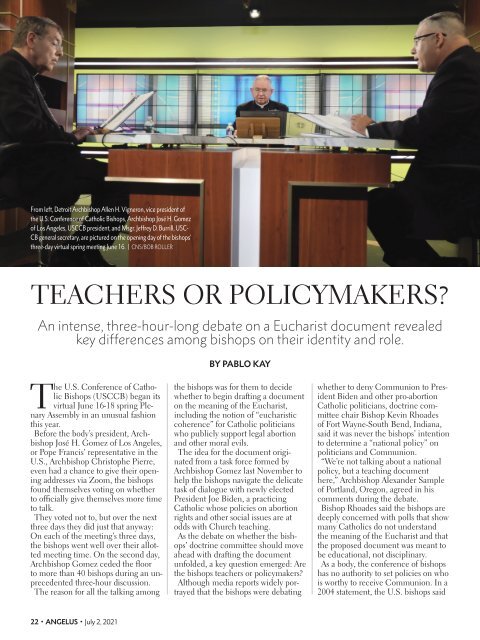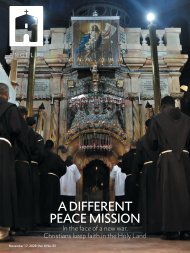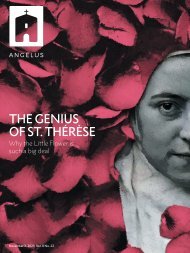Angelus News | July 2, 2021 | Vol. 6 No. 13
On the cover: For a Christian, how important is taking care of the mind? This year’s “Books Issue” has a few ideas. On Page 10, Mike Aquilina interviews Catholic convert and writer Zena Hitz on her new book about “the pleasures of the intellectual life.” On Page 14, Angelus contributors share their picks for the best new books of the pandemic. And on Page 18, Elise Italiano Ureneck reviews a groundbreaking new book by a scholar with autism who sees his condition as an intellectual gift from God.
On the cover: For a Christian, how important is taking care of the mind? This year’s “Books Issue” has a few ideas. On Page 10, Mike Aquilina interviews Catholic convert and writer Zena Hitz on her new book about “the pleasures of the intellectual life.” On Page 14, Angelus contributors share their picks for the best new books of the pandemic. And on Page 18, Elise Italiano Ureneck reviews a groundbreaking new book by a scholar with autism who sees his condition as an intellectual gift from God.
Create successful ePaper yourself
Turn your PDF publications into a flip-book with our unique Google optimized e-Paper software.
From left, Detroit Archbishop Allen H. Vigneron, vice president of<br />
the U.S. Conference of Catholic Bishops, Archbishop José H. Gomez<br />
of Los Angeles, USCCB president, and Msgr. Jeffrey D. Burrill, USC-<br />
CB general secretary, are pictured on the opening day of the bishops’<br />
three-day virtual spring meeting June 16. | CNS/BOB ROLLER<br />
TEACHERS OR POLICYMAKERS?<br />
An intense, three-hour-long debate on a Eucharist document revealed<br />
key differences among bishops on their identity and role.<br />
BY PABLO KAY<br />
The U.S. Conference of Catholic<br />
Bishops (USCCB) began its<br />
virtual June 16-18 spring Plenary<br />
Assembly in an unusual fashion<br />
this year.<br />
Before the body’s president, Archbishop<br />
José H. Gomez of Los Angeles,<br />
or Pope Francis’ representative in the<br />
U.S., Archbishop Christophe Pierre,<br />
even had a chance to give their opening<br />
addresses via Zoom, the bishops<br />
found themselves voting on whether<br />
to officially give themselves more time<br />
to talk.<br />
They voted not to, but over the next<br />
three days they did just that anyway:<br />
On each of the meeting’s three days,<br />
the bishops went well over their allotted<br />
meeting time. On the second day,<br />
Archbishop Gomez ceded the floor<br />
to more than 40 bishops during an unprecedented<br />
three-hour discussion.<br />
The reason for all the talking among<br />
the bishops was for them to decide<br />
whether to begin drafting a document<br />
on the meaning of the Eucharist,<br />
including the notion of “eucharistic<br />
coherence” for Catholic politicians<br />
who publicly support legal abortion<br />
and other moral evils.<br />
The idea for the document originated<br />
from a task force formed by<br />
Archbishop Gomez last <strong>No</strong>vember to<br />
help the bishops navigate the delicate<br />
task of dialogue with newly elected<br />
President Joe Biden, a practicing<br />
Catholic whose policies on abortion<br />
rights and other social issues are at<br />
odds with Church teaching.<br />
As the debate on whether the bishops’<br />
doctrine committee should move<br />
ahead with drafting the document<br />
unfolded, a key question emerged: Are<br />
the bishops teachers or policymakers?<br />
Although media reports widely portrayed<br />
that the bishops were debating<br />
whether to deny Communion to President<br />
Biden and other pro-abortion<br />
Catholic politicians, doctrine committee<br />
chair Bishop Kevin Rhoades<br />
of Fort Wayne-South Bend, Indiana,<br />
said it was never the bishops’ intention<br />
to determine a “national policy” on<br />
politicians and Communion.<br />
“We’re not talking about a national<br />
policy, but a teaching document<br />
here,” Archbishop Alexander Sample<br />
of Portland, Oregon, agreed in his<br />
comments during the debate.<br />
Bishop Rhoades said the bishops are<br />
deeply concerned with polls that show<br />
many Catholics do not understand<br />
the meaning of the Eucharist and that<br />
the proposed document was meant to<br />
be educational, not disciplinary.<br />
As a body, the conference of bishops<br />
has no authority to set policies on who<br />
is worthy to receive Communion. In a<br />
2004 statement, the U.S. bishops said<br />
22 • ANGELUS • <strong>July</strong> 2, <strong>2021</strong>


















